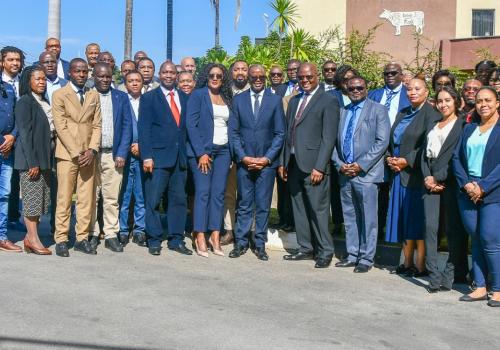The Southern African Development Community (SADC) convened the validation workshop on the Study to Evaluate the Impact of the Electronic Certificate of Origin (e-CoO) among the SADC Implementing Member States in Lusaka, Republic of Zambia, from 11 to 12 June 2025.
The impact assessment study on e-CoO was commissioned as per the guidance of Trade Negotiation Forum (TNF) during their meeting held in May 2024. In fulfilling that decision, the SADC Secretariat, with the support of GIZ under the Cooperation for Enhancement of SADC Regional Economic Integration (CESARE) Programme, conducted a comprehensive survey and drafted a report presenting findings and recommendations.
Mr. Alcides Monteiro, Senior Programme Officer, Customs in his opening remarks provided the background of the workshop and indicated that the purpose was to pursue the implementation of the e-CoO as per the decision taken by the Committee of Ministers of Trade (CMT), during its 31st meeting held in June 2019 in Windhoek, Namibia in which approved the SADC e-CoO Framework and directed the Secretariat to facilitate its implementation.
He also advised the participants that the e-CoO impact assessment workshop was happening at the time when the AfCFTA is embarking on developing e-CoO Business process for the continent. He shared that in May 2025 an AfCFTA mission visited the SADC Secretariat in Gaborone, Botswana on a benchmarking exercise to developed a continental initiative as mandate by their Council of Minister of Trade during their annual meeting held in April 2025 in Kinshasa, DRC.
Mr. Dingani Banda, the Commissioner General of Zambia Revenue Authority (ZRA), in his remarks as Guest of Honour, emphasised the importance of digital transformation in trade within the SADC region. He stated that the e-CoO initiative, endorsed in 2019 by the Ministers, aims to modernise trade processes, reduce costs of doing business, combat fraud, and enhance efficiency. Mr Banda commended Member States, who have been pioneers in piloting the system as part of broader trade reforms, including electronic customs data exchange and smart border management.
The workshop was chaired by Mr. Batsirai Chadzingwa Commissioner Customs in the Zimbabwe Revenue Authority (ZIMRA). He underscored the need of digitising trade and customs processes in the 21st century in line with emerging paradigms such as e-commerce, e-payment, and e-CoO. This initiative will promote investment, improve easy of doing business and support the implementation of the Industrialisation Strategy as part of consolidation of the Free Trade Area in line with the Regional Integration Agenda.
The e-CoO concept was launched in September 2022 in Blantyre, Malawi and to date, Eswatini, Botswana, Mauritius, Namibia, United Republic of Tanzania and Zimbabwe are successfully implementing the concept. The SADC certificate of origin is trade documents which attest the origin of goods and benefit therefore for duty free and quota and it was being processed manually since the start of implementation of the Free Trade Area in 2008. The move from Manual to electronic processing of certificate of origin is great milestone for the SADC Regional Integration agenda.
Some of the benefits of the SADC e-Certificate of Origin includes the following:
reduces transaction cost and saves times as there is no need to visit customs offices for application and its registration, these are done online;
eliminates fraud since it is transmitted electronically to import country;
reduces Cross-border certificate verification time; and
improves availability of accurate statistical data.
The workshop served as a platform to validate the study on the impact of the implementation of the e-CoO, reflect on findings and redefine strategies to enhance its full implementation across Member States as per the Action Plan drafted. The aspiration is that by 2026 all SADC Member States participating in the Free Trade Area fully implement the e-CoO and facilitate trade in supporting the SADC Industrialisation Agenda.

